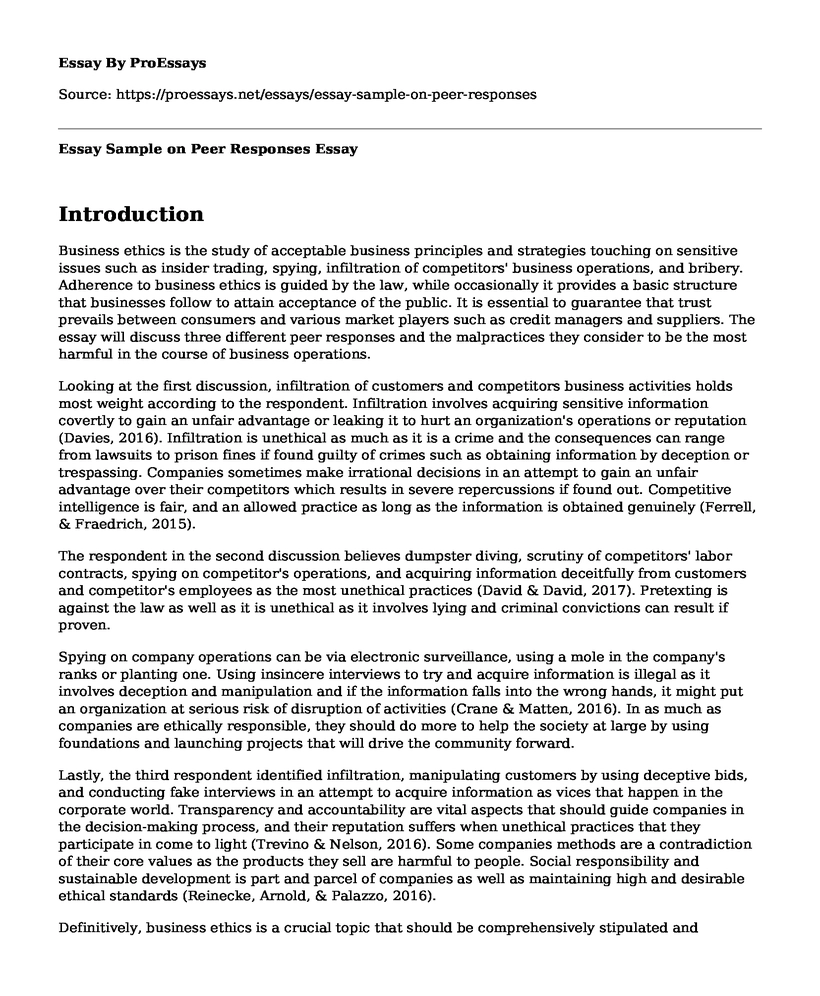Introduction
Business ethics is the study of acceptable business principles and strategies touching on sensitive issues such as insider trading, spying, infiltration of competitors' business operations, and bribery. Adherence to business ethics is guided by the law, while occasionally it provides a basic structure that businesses follow to attain acceptance of the public. It is essential to guarantee that trust prevails between consumers and various market players such as credit managers and suppliers. The essay will discuss three different peer responses and the malpractices they consider to be the most harmful in the course of business operations.
Looking at the first discussion, infiltration of customers and competitors business activities holds most weight according to the respondent. Infiltration involves acquiring sensitive information covertly to gain an unfair advantage or leaking it to hurt an organization's operations or reputation (Davies, 2016). Infiltration is unethical as much as it is a crime and the consequences can range from lawsuits to prison fines if found guilty of crimes such as obtaining information by deception or trespassing. Companies sometimes make irrational decisions in an attempt to gain an unfair advantage over their competitors which results in severe repercussions if found out. Competitive intelligence is fair, and an allowed practice as long as the information is obtained genuinely (Ferrell, & Fraedrich, 2015).
The respondent in the second discussion believes dumpster diving, scrutiny of competitors' labor contracts, spying on competitor's operations, and acquiring information deceitfully from customers and competitor's employees as the most unethical practices (David & David, 2017). Pretexting is against the law as well as it is unethical as it involves lying and criminal convictions can result if proven.
Spying on company operations can be via electronic surveillance, using a mole in the company's ranks or planting one. Using insincere interviews to try and acquire information is illegal as it involves deception and manipulation and if the information falls into the wrong hands, it might put an organization at serious risk of disruption of activities (Crane & Matten, 2016). In as much as companies are ethically responsible, they should do more to help the society at large by using foundations and launching projects that will drive the community forward.
Lastly, the third respondent identified infiltration, manipulating customers by using deceptive bids, and conducting fake interviews in an attempt to acquire information as vices that happen in the corporate world. Transparency and accountability are vital aspects that should guide companies in the decision-making process, and their reputation suffers when unethical practices that they participate in come to light (Trevino & Nelson, 2016). Some companies methods are a contradiction of their core values as the products they sell are harmful to people. Social responsibility and sustainable development is part and parcel of companies as well as maintaining high and desirable ethical standards (Reinecke, Arnold, & Palazzo, 2016).
Definitively, business ethics is a crucial topic that should be comprehensively stipulated and discussed in organizations for the employees to adhere to them. Unethical business practices are prevalent as competition is rife in today's market that results in underhand methods in an attempt to gain an advantage at any cost.
References
Crane, A., & Matten, D. (2016). Business ethics: Managing corporate citizenship and sustainability in the age of globalization. Oxford University Press.
David, F. R., & David, F. R. (2017). Strategic management: A competitive advantage approach, concepts & cases (16th ed.). Don Mills, Canada: Pearson Education Inc.
Davies, P. W. (2016). Current issues in business ethics. Routledge.Ferrell, O. C., & Fraedrich, J. (2015). Business ethics: Ethical decision making & cases. Nelson Education.
Reinecke, J., Arnold, D. G., & Palazzo, G. (2016). Qualitative methods in business ethics, corporate responsibility, and sustainability research. Business Ethics Quarterly, 26(4), xiii-xxii.
Trevino, L. K., & Nelson, K. A. (2016). Managing business ethics: Straight talk about how to do it right. John Wiley & Sons.
Cite this page
Essay Sample on Peer Responses. (2022, Dec 04). Retrieved from https://proessays.net/essays/essay-sample-on-peer-responses
If you are the original author of this essay and no longer wish to have it published on the ProEssays website, please click below to request its removal:
- The Imperial Hotel-London Case Study
- Horse Boarding Farm Business Essay
- Coffee House Description of the Business Plan Paper Example
- Accounting Fraud in Toshiba Company Paper Example
- Essay Example on HR Management: Ensuring Compliance for Organizational Success
- Essay Sample on Managers-Workers Relations: Key to Quality Productivity & Workplace Ethics
- Paper Sample on AccorHotels: Digital Transformation for Customer Engagement







